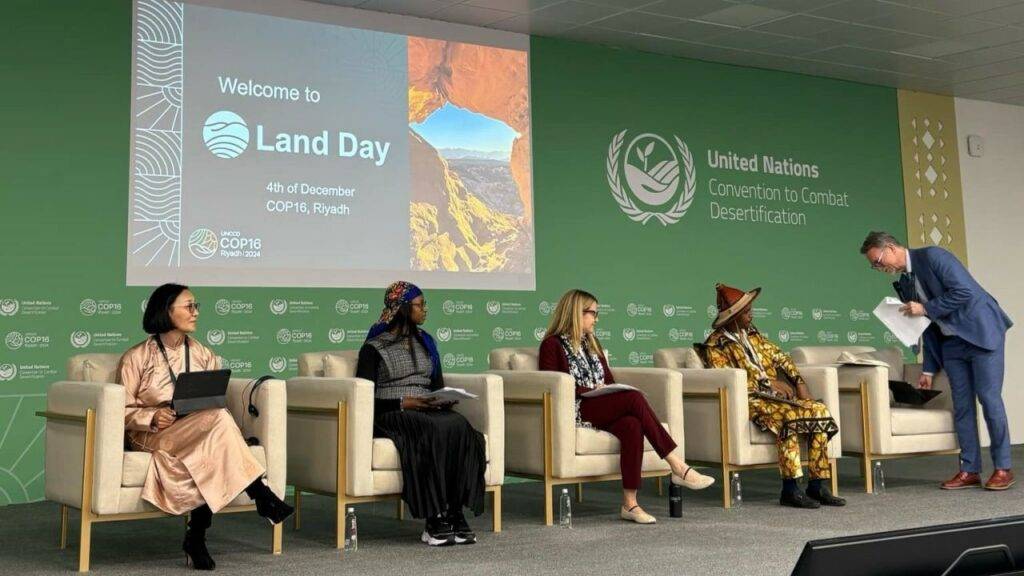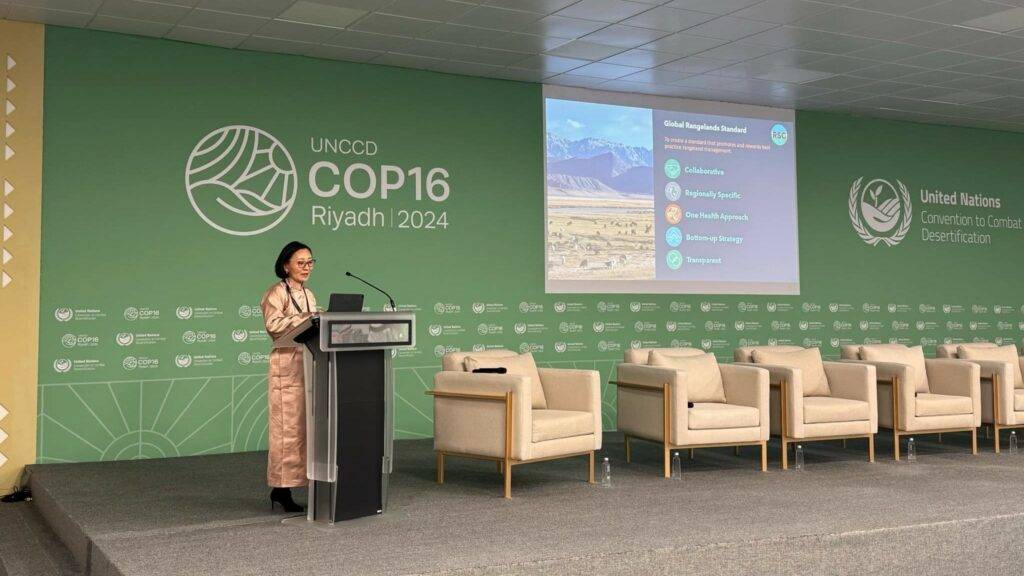
SFA & Rangeland Stewardship Council Partners Call For Private Sector Commitments to Drive Sustainable Land Management at UNCCD COP16
Last week marked the end of UNCCD COP16 in Riyadh, Saudi Arabia where global voices came together to renew commitment and accelerate investment and action to restore land and boost resilience for the benefit of people and the planet. Supported by the United Nations Convention to Combat Desertification (UNCCD) and the Global Environment Facility-funded STELARR (Sustainable Investments for Large Scale Rangeland Restoration) Project, which is implemented by IUCN and executed by ILRI and partners, the Sustainable Fibre Alliance (SFA) joined forces with these Rangeland Stewardship Council (RSC) partners during the two-week event to raise the call for a more inclusive approach to land management that places rangeland ecosystems at the heart of climate action. By officially introducing the RSC initiative, the SFA and its partners underscored the vital role that rangeland management plays in driving climate resilience and sustainability within global agricultural and commodity supply chains.
With a focus on advancing sustainable land management practices and supporting pastoral communities, the RSC initiative is advocating for comprehensive multi-stakeholder partnerships and policy frameworks that prioritise rangeland restoration, biodiversity conservation, and carbon sequestration. As part of the launch during UNCCD COP16’s Land Day events on 4th December 2024, the RSC called on governments and businesses to provide critical support for local communities managing rangelands, ensuring they are empowered to lead sustainable land use and commodity production efforts.
“We often forget, what is the human impact of climate change. How can we support herders and communities? How can we support indigenous knowledge and wisdom in bringing change?” said Una Jones, CEO of the SFA during the Fashion4Land panel discussion. “At the heart of how we [the SFA] support people is that we support herders and herding communities, empowering them and incentivising them in bringing effective land management and effective animal health welfare.”
Why is this so important? In Mongolia, for example, 1/3 of the population are nomadic herders. For millennia, Mongolians have been pastoralists of the land, living in one with the natural landscape and using traditional nomadic practices to graze their livestock. In the natural fibre sector, cashmere is a key income source for Mongolian herders, accounting for around 80-90% of their total income, with the livestock sector as a whole accounting for around 12% of Mongolia’s GDP. However, over the last 3 decades, the effects of land degradation, climate change, extreme weather conditions and overgrazing have accelerated leaving herders exacerbated, with more and more young herders opting to move to the cities and leave the herding lifestyle behind them.
Empowering Rangeland Managers for a Sustainable Future
The RSC initiative is built on the premise that sustainable rangeland management is essential not only for the health of ecosystems but also for the resilience of communities who depend on them. By providing a global platform for best practice development, the RSC aims to create a certification framework that will guide rangeland managers in improving grazing systems, soil health, and water conservation practices – the RSC Global Rangelands Standard. Through this initiative, the SFA and collaborating partners seek to ensure that rangelands continue to serve as critical resources for fibre and commodity production, biodiversity, and carbon sequestration.
The Need for Increased Support for Rangeland Ecosystems
Rangelands, which cover more than half of the planet’s surface, face increasing threats from climate change, unsustainable grazing, and land degradation. Yet, these regions remain crucial to food production and carbon storage. Despite this, rangeland managers often lack the necessary financial and technical support to adapt to the challenges they face. The RSC initiative, alongside its supporting partners, aims to change this by aligning with global sustainability goals and attracting investment in land stewardship practices.
“Within the SFA we think that collaboration and convening is one of the key ways for us to achieve greater impact together. Working across multi-stakeholder environments we need to bring landscape jurisdiction-based approach, as well as working with wider stakeholders and wider sectors to be able to achieve the Land Degradation Neutrality,” said Jones. “It’s really important for us in bringing a collaborative approach – we always say, if you want to go quick, go on your own, but if you want to bring a greater impact it’s always important for us to work together, collaboratively.”
Collaboration for Impact
The official introduction of the RSC initiative at UNCCD COP16 comes at a pivotal time for global efforts to combat desertification and land degradation. With rangeland ecosystems under pressure, the initiative emphasises the need for collaborative action across governments, businesses, and local communities to restore and protect these critical areas.
Through its partnership with other stakeholders, the SFA is focused on ensuring that the rangeland management community has the resources and knowledge to thrive. This includes not only improved financial investment but also policy support and capacity building for those on the frontlines of land stewardship.
“In order to protect the rangelands, you need to protect the interests and livelihoods of those who are living on those rangelands, whether they are the humans or the other animals occupying that space, you need to look after all three of those as one,” said David McElroy, Head of Standards at the SFA during the ‘Sustainable Commodities and the RSC’ side event during UNCCD COP16.
A Call to Action
As world leaders gathered to discuss the future of land restoration, the RSC and SFA’s call to action stressed the importance of prioritising restoration and sustainable management of our world’s rangelands. The RSC initiative offers an innovative solution to tackling land degradation while providing tangible benefits for local communities and industries that depend on healthy ecosystems.
Learn more about the Rangeland Stewardship Council initiative on the RSC website or by contacting info@rangelandstewardship.org

Notes to Editors
Global rangelands and climate change:
Rangelands are highly vulnerable to the impacts of climate change, including extreme weather events, water scarcity, and biodiversity loss. Ensuring that rangeland ecosystems are managed sustainably is key to maintaining their function as carbon sinks and vital sources of fibre.
UNCCD COP16 Events Hosted & Participated by the SFA & RSC:
- 4 December – Land Day ‘Global Rangelands Standard: A Framework for Sustainable Pastoral Futures’
- 4 December – Land Day ‘COP Presidency Event on Rangelands’
- 4 December – Land Day ‘Fashion4Land Event at UNCCD COP16’
- 11 December – ‘Pastoralist Women Restoring Rangelands’
- 11 December – ‘Sustainable Investments for Large-Scale Rangeland Restoration’
- 12 December – ‘Sustainable Commodities & the RSC’
- 12 December – ‘Camelid Standard Development by the RSC’

Katy Edwards
SFA MARKETING & COMMUNICATIONS MANAGER
16 December 2024

